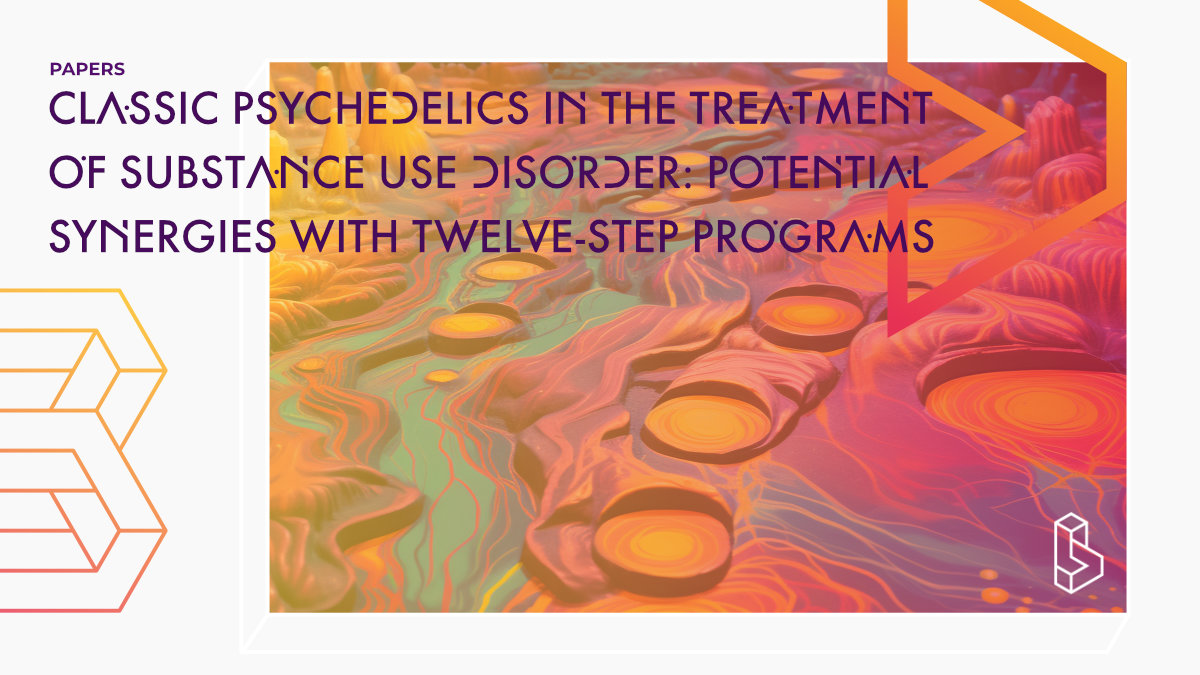This paper proposes that there are synergies to be found between psychedelics for substance use disorders and the twelve-step facilitation (TSF) program, specifically Alcoholics Anonymous (AA). Although controversial, as total abstinence is often promoted, the founder of AA (Bill Wilson) did have positive experiences with psychedelics.
Abstract of Classic psychedelics in the treatment of substance use disorder: Potential synergies with twelve-step programs
“Several pilot studies have provided evidence supporting the potential of classic psychedelics like psilocybin in the treatment of substance use disorders (SUDs). If larger trials confirm efficacy, classic psychedelic-assisted psychotherapy may eventually be integrated into existing addiction treatments such as cognitive behavioral therapy, contingency management, and medication-assisted therapies. Many individuals seeking treatment for SUDs also join twelve-step facilitation (TSF) programs like Alcoholics Anonymous (AA), which are among the most widely available and accessed treatments for alcohol use disorder worldwide. For such individuals, engaging in classic psychedelic-assisted psychotherapy could be seen as controversial, as members of AA/TSF programs have historically rejected medication-assisted treatments in favor of a pharmacotherapy-free approach. We argue that classic psychedelics and the subjective experiences they elicit may represent a special, more compatible case than conventional medications. In support of this claim, we describe Bill Wilson’s (the founder of AA) little known experiences with psychedelics and on this basis, we argue that aspects of classic psychedelic treatments could complement AA/TSF programs. We provide a review of clinical trials evaluating psychedelics in the context of SUDs and discuss their potential large-scale impact should they be ultimately integrated into AA/TSF.”
Authors: David B. Yaden, Andrea P. Berghella, Paul S. Regier, Albert Garcia-Romeu, Matthew W. Johnson & Peter S. Hendricks
Summary of Classic psychedelics in the treatment of substance use disorder: Potential synergies with twelve-step programs
Bill Wilson was on his fourth attempt to recover from alcohol use disorder (AUD) when he experienced a spiritual awakening while taking an admixture containing henbane and belladonna. He went on to found Alcoholics Anonymous (AA), the template for all twelve-step facilitation (TSF) programs.
Bill Wilson experienced a transcendent spiritual experience while taking lysergic acid diethylamide (LSD) in 1956. His positive experiences with LSD led him to believe that psychedelics like LSD could be used to facilitate transcendent experience and help in the treatment of substance use disorder.
The founder of AA believed LSD could be a crucial tool in treating addiction, but his promotion of LSD was actively suppressed by AA, the very organization that he founded.
Find this paper
https://doi.org/10.1016/j.drugpo.2021.103380
Open Access | Google Scholar | Backup | 🕊
Cite this paper (APA)
Yaden, D. B., Berghella, A. P., Regier, P. S., Garcia-Romeu, A., Johnson, M. W., & Hendricks, P. S. (2021). Classic psychedelics in the treatment of substance use disorder: potential synergies with twelve-step programs. International Journal of Drug Policy, 98, 103380.
Authors
Authors associated with this publication with profiles on Blossom
Matthew JohnsonMatthew Johnson is an Associate Professor of Psychiatry and Behavioral Sciences at Johns Hopkins University. His research is concerned with addiction medicine, drug abuse, and drug dependence.
Albert Garcia-Romeu
Albert Garcia-Romeu is one of the principal researchers in the renaissance of psychedelics studies. He is doing his research at Johns Hopkins and focuses on psilocybin and how it can help with treating addiction.
Institutes
Institutes associated with this publication
Johns Hopkins UniversityJohns Hopkins University (Medicine) is host to the Center for Psychedelic and Consciousness Research, which is one of the leading research institutes into psychedelics. The center is led by Roland Griffiths and Matthew Johnson.

